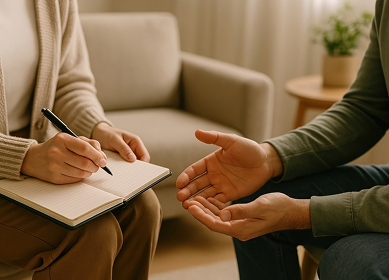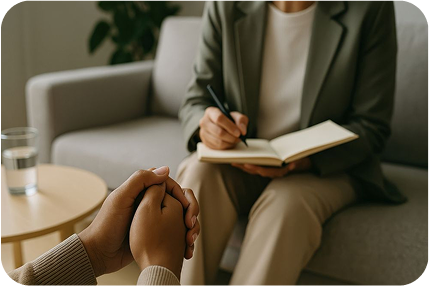Understanding Anxiety
We all feel nervous sometimes, before a big presentation, during tough conversations, or when life feels unpredictable. A little worry is normal. It helps us stay alert and prepare for challenges. But what if that worry sticks around even after the moment has passed? What if it starts getting in the way of how you live your life?
As someone from the field of mental health, I’ve come to learn that anxiety is much more common than many people think. Yet, it often goes unnoticed or unspoken. It’s easy to dismiss it as just “stress” or “overthinking,” especially when the signs aren’t always obvious.
In this post, we’ll walk through what anxiety is, how you can recognize it, and when it might be a good idea to seek support.


What Is Anxiety?
Anxiety is your body’s natural response to stress. It’s part of the built-in “fight or flight” system that helps protect us from danger. But when that alarm keeps going off, even when there’s no real threat, it can become overwhelming.
Many people describe anxiety as a constant buzz in the background: racing thoughts, overthinking, and a feeling that something bad might happen, even if you don’t know what.
How to Know If You’re Experiencing Anxiety
Anxiety shows up differently for everyone, but here are some common signs you might notice:
- Worrying a lot, even about things that seem small
- Feeling tense or on edge most of the time
- Trouble focusing or making decisions
- A sense of dread or fear that something might go wrong
- Headaches or muscle tension
- Faster heartbeat or chest tightness
- Stomach-aches or feeling nauseous
- Trouble sleeping, or always feeling tired
- Avoiding certain people, places, or tasks
- Frequently seeking reassurance
- Cancelling plans because of nerves
- Putting things off because you’re afraid of making a mistake
Learning what triggers your anxiety is a big step toward managing it. That’s something therapy can really help with.
Anxiety is your body’s natural response to stress, a built-in alarm
system but when that system goes off, it can be overwhelming.
Anxiety vs. Stress: What’s the Difference?
Stress usually comes from something specific, like a deadline or a big event. Once it’s over, the stress tends to fade. But anxiety can stick around, even when there’s no clear reason. It can feel like your mind is always preparing for the worst, even during calm moments
What Causes Anxiety?
Anxiety doesn’t have one clear cause. It often develops from a mix of things, such as:
- Family history or genetics
Personality (for example, being very self-aware or sensitive) - Difficult experiences in childhood
- Long-term stress or burnout
- Poor sleep, too much caffeine, or lack of boundaries
Learning what triggers your anxiety is a big step toward managing it. That’s something therapy can really help with.
When Should You Reach Out for Help?
You don’t have to wait until things feel “bad enough” to seek help. If anxiety is getting in the way of your everyday life, that’s reason enough. You might want to consider reaching out if:
- Your mind feels like it’s always racing
- You’re avoiding things you used to enjoy
- You’re constantly exhausted but can’t seem to relax
- Your worries feel too big to handle alone
Working with a psychologist or mental health professional can give you tools to better understand and manage anxiety. There are proven approaches, like Cognitive Behavioural Therapy (CBT) and mindfulness, that help people every day feel more in control of their thoughts and emotions.
Anxiety isn’t a weakness, and it’s not something you need to “push through” on your own. It’s a valid, treatable mental health condition that affects many people and there is no shame in needing support.
As someone just beginning my journey in this field, I’ve seen how powerful it can be when people feel heard, understood, and supported. Whether you’re just starting to notice the signs of anxiety or have been struggling for a while, reaching out can be the first step to feeling better.
We’re here to listen and walk alongside you. If you’d like to learn more or talk about how we can help, feel free to reach out for a consultation.


